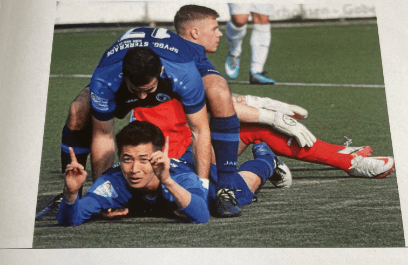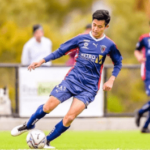Hello, I’m Masaya.
Today, I’d like to share in detail about my life in Tanzania.
Why I Went to Tanzania
“Why Tanzania?”
This was the question everyone asked me when I told them I was going to Tanzania.
The reason I traveled to Tanzania was soccer. By chance, I had a connection to soccer in Tanzania, and I was given the opportunity to join a team’s practice sessions.
To cut to the chase, I wasn’t able to sign a contract with the team. As a result, I plan to return to Germany and continue playing soccer there.
However, even though it was only two months, the experience of playing soccer here has become an irreplaceable treasure in my life, and I feel this deeply as I write this.
Life as a Professional Soccer Player
I’ve played soccer in Australia and Germany before, and although I’ve signed professional contracts in my life, I’ve never played as a true professional soccer player.
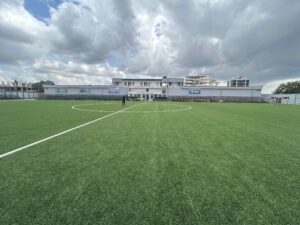
This time, the team I joined in Tanzania competes in the Tanzanian Premier League, and all the players live as professional soccer players.
Some of them were national players representing regions like Somalia and Tanzania.
The inspiration I got from them was incredibly impactful.
Let me explain a typical weekly cycle:
- Monday to Friday: Practice from 10 AM
- Saturday or Sunday: Either a match or practice
(Practices involve traveling to facilities via the team bus.)
It was seven days immersed in soccer.
To be honest, I felt that I had better skills with ball than many of them. However, I struggled with the unique physical abilities of African players and the humid climate.
One thing I can say is this: “Their hunger to succeed is on another level.” Their preparation before practice and their attitude during training were noticeably different. Some players even talked about wanting to play soccer in America to earn money. Their ambition was something I could learn a lot from.
Although I wasn’t able to sign a contract, participating in preseason friendlies, using the training facilities, and practicing daily were invaluable experiences.
For about two weeks after deciding to return to Germany, I kept wondering what to do next. But now I can move forward, seeing it as a great learning experience.
Still, my desire to play soccer in Tanzania hasn’t changed. (Haha)
Life in Tanzania
Now, I’d like to talk about my experiences outside of soccer.
When you think of Tanzania, you might associate it with Africa, and Africa might bring to mind stereotypes like danger, fear, or diseases.
During the preparation phase, I didn’t think much about it. But right before boarding my flight at Frankfurt Airport in Germany, I remember suddenly feeling strangely nervous, thinking, “Oh, this might be scary.”
(By the way, I got about five vaccinations two weeks before the trip. Haha.)
It was a stronger feeling than when I boarded my first flight to Australia, my first experience abroad.
I arrived in Zanzibar, a Tanzanian island famous for tourism. From there, I took a ferry to the Tanzanian mainland.
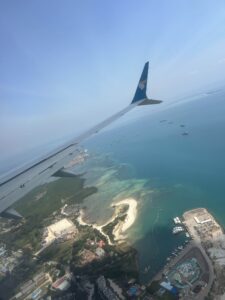
The moment I landed at the airport and passed through passport control, a security-like person persistently asked me, “Do you need a taxi?” I handed over my suitcase as he offered to help, all while keeping a close watch to make sure nothing was stolen.
Nothing was stolen, but then he said, “I helped you, so give me $10.” It seemed too much, and when I hesitated, he said, “I’m struggling to make a living.”
I thought, “That’s a cheap trick,” but I gave him €5 and got in the taxi.
At the ferry terminal, there were also persistent people offering to carry my bags, but this time I firmly refused.
I learned my lesson: if I kept giving €5 each time, I’d run out of money. (Haha)
From experiences like this, you can tell that Tanzania isn’t as affluent as Japan, Germany, or Australia. (For example, the apartment I lived in for two months cost about €60 per month.)
Tanzanian Food
In one word: delicious!
The staple food is something called “Ugali,” made by kneading maize (white corn) flour into hot water and solidifying it. Many people also eat rice. Here are some photos.
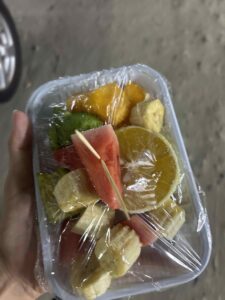
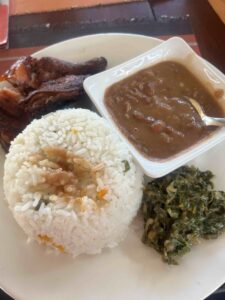
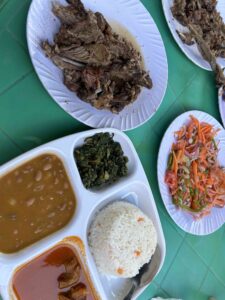
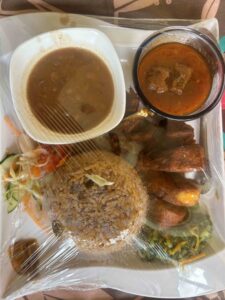
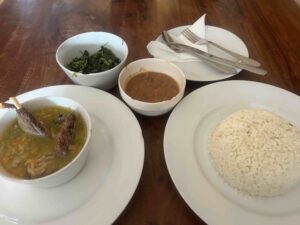
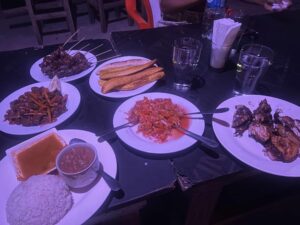
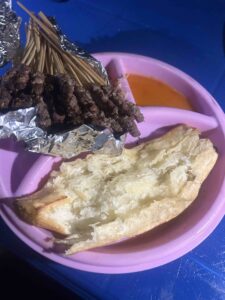
My favorites were “Pilau” and “Cassava.”
- Pilau: Spiced fried rice.
- Cassava: A starchy root vegetable.
Please look them up for details. (Haha) The fruits were also incredibly fresh and different. I even tried “sugarcane,” which we usually consume as refined sugar. Unlike the usual image of sugar being unhealthy, sugarcane is surprisingly good for you.
The meat, fish, and vegetables were also flavorful, with the freshness of the ingredients making them enjoyable. Honestly, Tanzanian food is as delicious as Japanese cuisine in my opinion.
Forms of Happiness
“Success as a soccer player,” “Becoming wealthy,” “Having a family,” “Traveling extensively,” “Moving abroad” — there are countless forms of happiness.
In Tanzania, I realized once again the importance of “smiles” and “sunshine.” As simple as it may seem, without these, perhaps none of the happiness we seek would exist.
The Moment I Realized the Power of a Smile
Tanzania’s transportation system isn’t well-developed. There are only cars, buses, and motorcycles for travel, with no trains. Roads aren’t well-maintained, and traffic rules are vague. “As long as there’s no accident, it’s fine” seems to be the mindset, with people casually running red lights. (Haha)
One day, a friend of mine got stuck in traffic and got into an argument with another driver. They started yelling at each other, but it ended with both smiling. It was such a surreal moment.
Tanzania was a short but meaningful chapter of my life. I hope to return in the future and share even more about this beautiful country.
In my next post, I’ll talk about exploring Zanzibar as a tourist.
